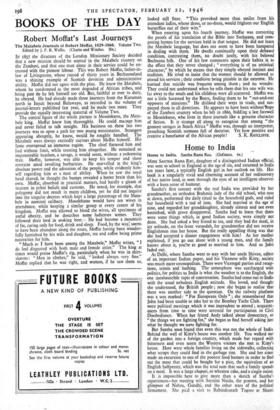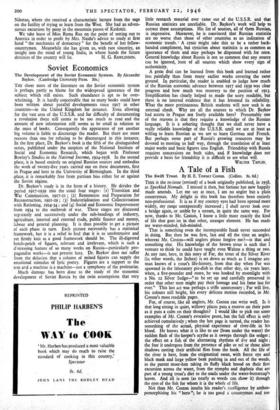Home to India
Home to India. Santha Rama Rau. (Gollancz. 6s.) MISS SANTHA Rama Rau, daughter of a distinguished Indian official, was sent to school in England at the age of six, and returned to India ten years later, a typically English girl in her outlook on life. Her book is a singularly vivid and charming account of her rediscovery of her native land, as seen through the eyes of an intelligent observer with a keen sense of humour.
Santha's first contact with the real India was provided by her grandmother, an orthodox Brahmin lady of the old school, who rose at dawn, performed the daily ritual to the household gods, and ruled her household with a rod of iron. She had married at the age of nine, and regarded her granddaughter, already sixteen and not even betrothed, with grave disapproval. Santha had to learn that there were some things which, in good Indian society, were simply not done. She had asked a boy friend to tea, and they had the meal, in icy solitude, on the front verandah, for grandmother did not receive Englishmen into her house. But the really appalling thing was that she had accepted a dinner engagement with him! As her mother explained, if you go out alone with a young man, and the family knows about it, you're as good as married to him. And so John faded out.
At Delhi, where Santha went to stay with her uncle Shivan, editor of an important Indian paper, and his Viennese wife Kitty, society was much more cosmopolitan. There were Viceregal parties and recep- tions, tennis and bathing. The atmosphere was surcharged with politics, for politics to India is what the weather is to the English, the one inexhaustible topic of conversation. Santha had come out to India with the usual nebulous English attitude. She loved, and thought she understood, the British people ; now she began to realise that there was another side to the question. On the railway platform was a seat marked : " For Europeans Only " ; she remembered that John had been unable to take her to the Bombay Yacht Club. There were political meetings which it was imprudent to attend ; acquaint- ances from time to time were arrested for participation in Civil Disobedience. When her friend Andy talked about democracy, or " the things we are fighting for," she began to find herself asking just what he thought we were fighting for.
But Santha soon found that even this was not the whole of India. Behind the wall of Kitty's house was another life. You walked out of the garden into a foreign country, which made her regard with bitterness and even scorn the Western visitors she met at Kitty's house. Here were whole families living on the sidewalks, collecting what scraps they could find in the garbage tins. She and her sister made an excursion to one of the poorest food bazaars in order to fmd out the most that could be bought for a pice, the equivalent of an English halfpenny, which was the total sum that such a family spends on a meal. It was a large chapati, or wheaten cake, and a single onion.
It is impossible here to give more than a sketch of Santha's experiences—her meeting with Sarojini Naidu, the poetess, and her glimpses of Nehru, Gandhi, and the other stars of the political firmament. She paid a visit to Rabindranath Tagore at Shanti Niketan, where she received a characteristic lecture from the sage on the futility of trying to learn from the West. She had an adven- turous excursion by pony in the mountain passes of Kashmir.
We take leave of Miss Rama Rau on the point of setting out to America in order to profit by Mrs. Naidu's advice to study at first hand " the mechanics of democracy " for the benefit of her fellow- countrymen. Meanwhile she has given us, with rare sincerity, an insight into the mind of young India, in whose hands the future































 Previous page
Previous page